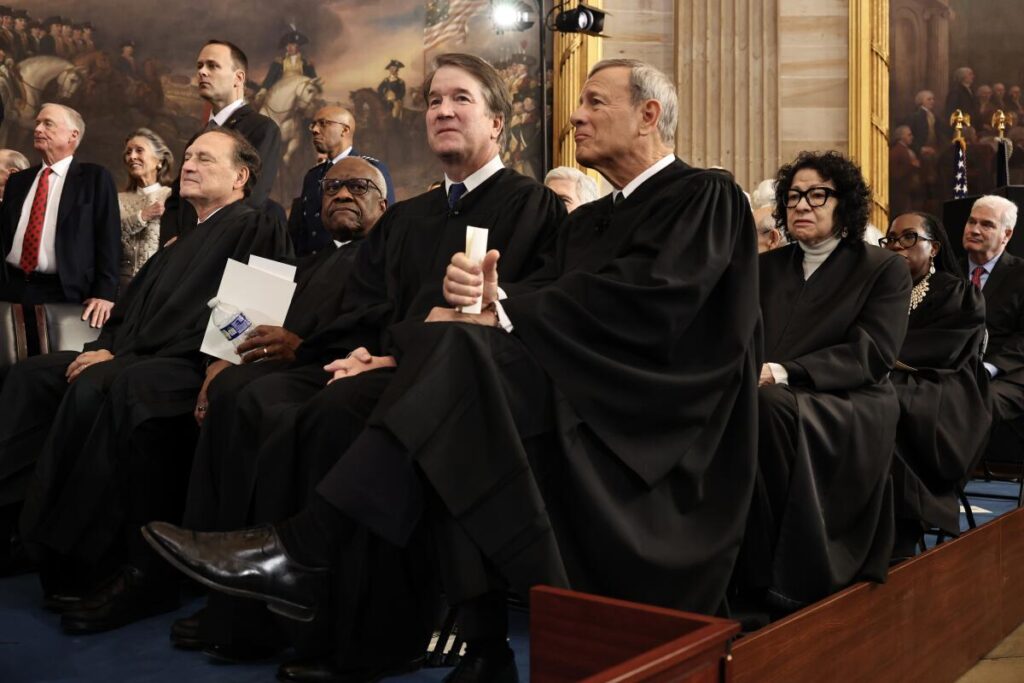WASHINGTON — The Supreme Court opens its new term on Monday and is scheduled to hear arguments in 33 cases this fall.
The justices will hear challenges to transgender rights, voting rights and Trump tariffs and will reconsider a 90-year-old precedent that protects officials of independent agencies from being fired by the president.
Here are the major cases set for argument:
Conversion therapy and free speech: Does a licensed mental health counselor have a 1st Amendment right to talk to patients under age 18 about changing their sexual orientation or gender identity, even if doing so is prohibited by state law?
California in 2012 was first state to ban “conversion therapy,” believing it was harmful to minors and leads to depression and suicide. Other states followed, relying on their authority to regulate the practice of medicine and to prohibit substandard care.
The Alliance Defending Freedom, a Christian legal group, sued on behalf of a Colorado counselor and argued that the state is “censoring” her speech. (Chiles vs. Salazar, to be argued on Tuesday.)
Supreme Court Justices Samuel A. Alito Jr., left, Clarence Thomas and Brett M. Kavanaugh and Chief Justice John G. Roberts Jr. attend inauguration ceremonies for Donald Trump in the rotunda of the U.S. Capitol on Jan. 20 in Washington.
(Chip Somodevilla / Getty Images)
Voting rights and Black majority districts: Does a state violate the Constitution if it redraws its congressional districts to create one with a Black majority?
In the past, the court has said racial gerrymandering is unconstitutional. But citing the Voting Rights Act, it also has ruled states must sometimes create an electoral district where a Black or Latino candidate has a good chance to win.
Otherwise, these minorities may be shut out from political representation in Congress, state legislatures or county boards.
But Justice Clarence Thomas has argued for outlawing all use of race in drawing district lines, and the court may adopt his view in a pending dispute over a second Black majority district in Louisiana. (Louisiana vs. Callais, to be argued Oct. 15.)
Trump and tariffs: Does President Trump have legal authority acting on his own to impose large import taxes on products coming from otherwise friendly countries?
Trump is relying on a 1977 law that empowers the president to act when faced with an “unusual and extraordinary threat” from abroad. The measure does not mention tariffs or taxes.
In a pair of cases, lower courts ruled the tariffs were illegal but kept them in place for now. Trump administration lawyers argue the justices should defer to the president because tariffs involve foreign affairs and national security. (Learning Resources vs. Trump, to be argued Nov. 5.)
The high court will look at whether transgender athletes can compete in certain sports. Above, a 100-meter hurdles event during a track meet in Riverside in April.
(Gina Ferazzi / Los Angeles Times)
Transgender athletes and school sports: Can a state prevent a transgender student whose “biological sex at birth” was male from competing on a girls sports team?
West Virginia and Idaho adopted such laws but they were struck down by judges who said they violated the Constitution’s guarantee of equal protection of laws and the federal Title IX law that bars sex discrimination in schools and colleges.
Trump voiced support for “keeping men out of women’s sports” — a characterization deemed false by transgender women and their advocates, among others. If the Supreme Court agrees, this rule is likely to be enforced nationwide under Title IX. (West Virginia vs. B.P.J. is due to be heard in December.)
Trump and independent agencies: May the president fire officials of independent agencies who were appointed with fixed terms set by Congress?
Since 1887, Congress has created semi-independent boards, commissions and agencies with regulatory duties. While their officials are appointed by the president, their fixed terms keep them in office when a new president takes over.
The Supreme Court upheld their independence from direct presidential control in the 1935 case of Humphreys Executor vs. U.S., but Trump has fired several such officials.
The current court has sided with Trump in two such cases and will hear arguments on whether to overturn the 90-year-old precedent. (Trump vs. Slaughter is due to be argued in December.)
